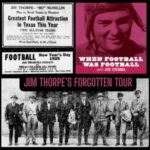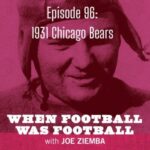No one…absolutely no one thought he was a professional football player.
In fact, the owner of his team took a first look at rookie Billy Cross and asked: “Who is that little fellow—the mascot?”
Billy Cross had heard it all before—that he was too short, too light, and not tough enough for football. Yet he persisted in continually proving his doubters wrong all the way through high school, college, and into the National Football League.
Billy Cross stood just 5-6 and weighed a mere 145 pounds when he joined the Chicago Cardinals in 1951—then made an immediate impact on head coach Curly Lambeau.

In just the second game of the 1951 season, Cross—by then nicknamed “Little Willie”–scored two touchdowns to lead the Cardinals to a 28-14 upset over the rival Chicago Bears. Cross tallied on an 18-yard pass reception from Frank Tripucka as well as on a 39-yard run. Lambeau declared the win was “a team victory,” and the Chicago Tribune agreed, but added:
“It might have been a team victory as the veteran coach of the red shirts said, but Cross dramatized the stunning 28-14 triumph over the Chicago Bears.” For his remarkable efforts, the Cardinals named Cross as their MVP of the game. The reward was a new suit and the grateful Cross admitted: “Maybe they selected me because they could have a suit made for me at one-third the price of outfitting some other guy!”
Is He The Mascot?
It was a major triumph for Cross, the speedy halfback who quietly suffered through the early misconception by Cardinals’ owner Violet Wolfner, according to the Tribune: “When Cross reported to training camp, Mrs. Violet Wolfner spotted him walking with Gene Ackerman, 6-5 rookie end from Missouri. ‘Who’s that little fellow—the mascot?’ asked Mrs. Wolfner of Lambeau. ‘No—he’s a player,’ Curly answered. She didn’t believe him!”
But the early success of Cross on the field made a believer of everyone within the Cardinals’ organization. For Cross, it was similar to a vinyl record on repeat: he heard it all before! He was a local legend at Canadian High School in Texas, graduating in 1947.
A later graduate of that school, Don Hodges, once said: “We’d go over and watch him practice every day. Anybody that grew up in that era knew about Billy Cross.” Despite piling up some impressive numbers in high school, Cross, at just 5-6, was not a target for any major college.
It wasn’t that Cross lacked the confidence to pursue football at the next level, it was just that the collegiate coaches were not thrilled about his size. Cross once recalled the disappointment of those days as reported in the Coffin Corner, the publication of the Professional Football Researchers Association:
“I wanted to go to TCU. Coach Dutch Meyer was coaching there at that time. I met him at the state track meet. He looked at me and said, ‘Son, you are too small for college.’”
Astonishing 9.2 Rushing Average
So, he accepted a basketball scholarship to attend West Texas State, where he also displayed some unique high jumping skills, once clearing 6-2 in a meet. His real love, however, was football although he would first need to retire any misconceptions about his size. The El Paso Herald-Post mentioned an unnamed educator at West Texas, “who discouraged offering a football scholarship to Cross because he’s too small.”
While in college, Cross acquired still another nickname as the “Canadian Comet” and established a career rushing record of 2,474 yards (with an astonishing 9.2 rushing average) that was not broken until Mercury Morris did so in 1968.
In addition, the Amarillo Globe-News reported that “Cross and fellow West Texas State runner Charles Wright combined for 2,400 yards in 1950 to break a single-season record previously held by the heralded Army runners Doc Blanchard and Glenn Davis.”
Soon, pro football scouts were attracted to the West Texas campus but coach Frank Kimbrough was concerned that the professional representatives would quietly slip away once they noticed his size. A few years later, the El Paso Herald-Post recalled that situation:
“When professional scouts came to the campus to look over Cross, West Texas State coach Frank Kimbrough would tell them to not base their judgment on his appearance, but to wait until they saw first-hand what he could do on a football field. Kimbrough was afraid they’d take one look at Cross and leave.”
Cross was also concerned about the possibility of his athletic future being derailed before it could get started: “I was afraid that would happen in pro ball and I wouldn’t ever get the chance.”
I Found Out Early He Was Tough
Yet the Chicago Cardinals listened to the glowing reports flowing back regarding the potential of Cross and drafted the mini-back in the 24th round of the 1951 draft. Cross was quick to pick up the pace in the NFL, although his initial reaction to the size of the players was as expected: “I felt like I had knocked on the wrong door!”
But once he was given the football, the shifty back won the admiration of both his coaches and his teammates. Coach Lambeau stated, “I found out early that he was tough. He proved to me he could do everything just as well, or better, than the players of normal size. He just runs past, or under, the big fellows.”
Cross would end up rushing for 283 yards, catching 18 passes for an additional 322 yards, and scoring six touchdowns for the Cardinals during the 1951 regular season with an admirable 5.3 rushing average.
Cross was prolific in an early exhibition game in 1952 which served as sort of a homecoming for Cross when the Cardinals met the Camp Polk Armadillos (LA) team in Lubbock, TX. The local media was happy to have Cross back in the area and celebrated his previous accomplishments.
The Lubbock Morning Avalanche joked that: “To say Cross is a ‘double cross’ is putting it mildly. He looks like the water boy but once he tucks the ball under his arm, it doesn’t matter how large the opposition. Cross is a gone man!”
The Cardinals destroyed the soldiers 66-7 as Cross scored three times in the exhibition rout, prompting the Lubbock Avalanche-Journal to report: “From the time L’ll Bill Cross scooted 14 yards around left end for the first touchdown after three minutes and four seconds of play, it was apparent that the score would be only what coach Joe Kuharich wanted it to be.”
Cross Knocked Over Ed Sprinkle Four Straight Times!
But it was his remarkable blocking that also impressed his fellow Cardinals. Here was the smallish Cross taking on anyone and everyone on the field. Lineman Bill Fischer marveled at the ability of Cross to lay down an effective block, especially in that early Bears’ game between the two Chicago rivals:
“That kid is great. He’s about 5-6 and yet he can jump up and touch the crossbar on the goalposts. Movies of the Bears game showed Cross knocking over Ed Sprinkle on four successive plays.”
Sprinkle, who was featured on a previous episode of “When Football Was Football,” as the “Meanest Man in Football” was not an easy foe to encounter.
The Coffin Corner shared a unique story about the blocking capabilities of Cross: “Cross was widely regarded as one of the best blocking backs in the NFL. Both Len Ford of the Browns and Ed Sprinkle of the Bears called him the best blocker of all the backs in the league.
High praise for the little man. One time Cross blocked the 6-5, 250-pound Ford so effectively that the Hall of Fame end took a tumble in a surprising flip. Ford exacted revenge the next time the little guy tried to take him with a crackback block. Cross said, ‘The next time I tried, he flicked his arm, and I rolled ten yards. He came over and helped me up!’”
In 1952, Cross enjoyed his best season rushing for 347 yards, just three behind team leader Charley Trippi and three ahead of Ollie Matson in the Cards’ balanced offense. Those numbers left Cross as the 19th best rusher in the NFL while his 18.8 average on kick returns was tenth best in the league. In addition, he picked up 234 more yards on 17 catches.
He had another solid year in 1953 with 196 yards rushing and 285 yards in receptions. Cross started eight of 12 games in each of the 1952 and 1953 seasons, but announced his retirement in July of 1954, indicating that he was leaving pro football to enter the business world.
Pound For Pound, The Greatest Football Player Ever
But Cross still had the itch to play football and surfaced just a week later when it was announced that he signed with the Toronto Argonauts in Canada. The Ottawa Citizen, noting the size of the new player, deftly observed: “Cross is a comparatively small man.”
Cross was used more as a safety for the club and was named to the league’s All-Star team after the season. Cross also rushed for 181 yards on 31 attempts and caught 11 passes for 191 yards. On defense, he picked off three passes and also returned 16 kickoffs for 373 yards with a return average of 23.3 yards. However, in December of 1954, the club decided to drop all of its “imported” players from the United States and the pro football career of Billy Cross came to an end.
Following his retirement, Cross owned a sporting goods store and was a long-time teacher back in the Canadian Independent School District. In 2012, his old high school constructed a full-size bronze statue of Billy Cross outside the football field in Canadian.
As for the final word on Billy Cross, we’ll refer to the Cardinals’ Hall of Famer Charley Trippi who once said: “Pound for pound, Cross was the greatest football player I ever saw.” He was one of the few who overcame his lack of size to prevail on the gridiron and led the way for recent standouts like Tarik Cohen, Trinidan Holliday, and others.
And let’s not forget Jack “Soapy” Shapiro who at 5-1 and 119 pounds, played one game for the Staten Island Stapletons in 1929 and remains the smallest player to ever play in the NFL. Thank you for joining us on this episode of “When Football Was Football” on the Sports History Network!
Author and Host - Joe Ziemba
Joe Ziemba is the host of this show, and he is an author of early football history in the city of Chicago. Here, you can learn more about Joe and When Football Was Football, including all of the episodes of the podcast.
Please Note – As an Amazon Associate I earn from qualifying purchases
Resources
More From When Football Was Football
Big Jim Thorpe’s Forgotten Football Vacation
It was December of 1924 when Big Jim Thorpe of...
Read MoreSearching for the “Zest” of the 1931 Chicago Bears
Throughout the history of professional football, every so often you...
Read MoreUgly Passers, Brick Walls, and Feisty Cardinals
Since the Arizona Cardinals are the NFL’s oldest team, with...
Read MoreThe NFL’s Forgotten Gold Medalist!
As usual during the staging of the Summer Olympics, numerous...
Read More


